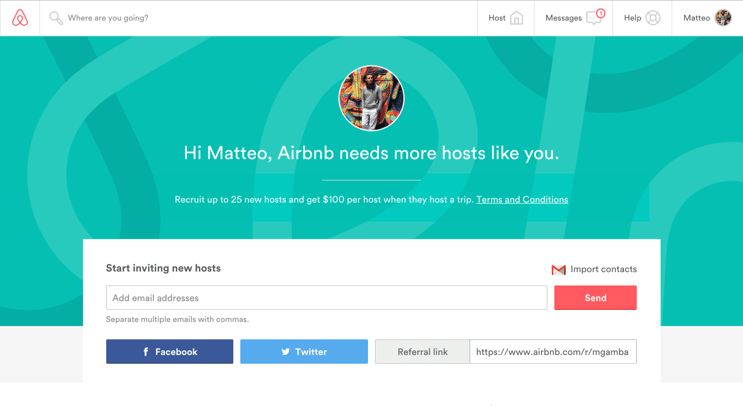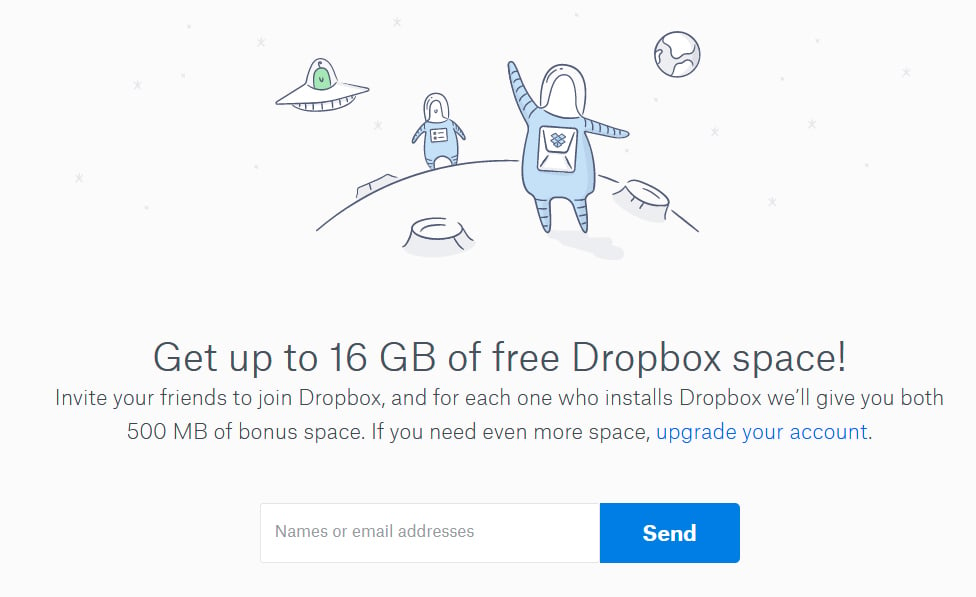Five Simple Marketing and Promotion Tips to help during COVID-19
In these difficult times, you may find your business slowing down and sales harder to come by. Given this trend, establishing and maintaining...
%20(1).png)
When your customers love doing business with you, they’re more likely to tell their friends, family, peers, business contacts and even neighbours about your business. That’s why so many brands pit considerable effort into their referral marketing efforts and why you need to make sure you have a business that is loved and easily referred.
Being loved comes down to making every interaction with your customers special. From the moment they become customers, every support question and all the way through to spontaneous moments of surprise and delight.
But being easily referred comes down to implementing referral programmes and advocacy initiatives that are user-friendly, fun and rewarding. In this article, we’ll share some of our favourite tactics for getting more customer referrals.

Customer referrals are quite simply the introduction of a prospective customer to your business from an existing customer. They can happen organically through conversations or through targeted referral marketing efforts.
They’re incredibly valuable to your business because the new customers don’t cost anywhere near the acquisition cost of other channels (i.e. social media, paid search). In addition, the customers are well-qualified because your customers know your business so well, and as a result, stay for longer.
Some companies benefit from customer referrals organically. That is, they don’t do anything to promote them. Whereas some companies spend considerable time and effort on encouraging more customer referrals.
Here are some examples of tactics that companies use to encourage customer referrals. We’ll explain some of these in more detail later in this article:
We’ve already mentioned that customers that come from referral campaigns are cheaper to acquire, stickier and happier. That’s because they start their relationship with you on the right foot. A strong brand advocate knows your product well and can instantly recognise if someone is a good fit, their expectations are clear — and they trust you.
There’s great power in peer recommendations, we all have made a purchase based on a tip from a friend. These tips come from happy customers. Happy customers make the best advocates, they’ve had real, valid experiences with your business that can be shared with their immediate network or wider through the power of the internet. Even better, reviews and referrals from happy customers are free.
Customer referrals provide another channel to reach potential customers that your standard marketing wouldn’t reach. These are people who don’t necessarily trust brand partnerships or sponsored reviews, they trust real experiences from real people in their network. Or they’re customers that are hard to reach via digital marketing, email marketing or other channels.
As we’ve mentioned above, happy customers can be your unofficial brand ambassadors, but without the cost of paying them. Even though these customers have already had a successful interaction with your business they still need to be nurtured and made sure every interaction is a pleasant one. By keeping existing customers engaged and fostering your relationship with them they will continue to feel valued and happy to share their positive experiences with your company.
The key here is that we’re not yet talking about a fancy referral programme with rewards, games and tracking. (Although we do advocate for those and will give you some ideas later in this article.) We’re talking about creating a solid business with exceptional customer support and sensible lifecycle communications.
HubSpot explain it well when they describe the customer acquisition process as a flywheel.

HubSpot | The Flywheel Model
The model explains the importance of acquiring customers and always giving them a delightful customer experience. That means making sure the onboarding is seamless (and the customer’s expectations are understood and managed), helping your customer get to that product or service “aha” moment (when it becomes unimaginable to not have a relationship with your business) and guaranteeing every ongoing interaction is easy, helpful and fast.
If you do that, you might not need an official customer referral programme. Your customers will be so happy with your product and service and so impressed with your service that they’re willing to recommend you organically.
Of course, there are some processes you can add to your business that will make it easier to refer you:
NPS Surveys – Not only will these give you great insight into how happy your customers are, but it also helps you find who your advocates are. Therefore, we recommend regularly surveying your customers. You can also cohort the advocates and give them extra love, ask them for reviews or give them referral codes they can give to other businesses.
Review Requests – After you’ve identified satisfied customers, ask them for reviews of your business. This could be on your Google My Business listing, your Facebook page or other sites like Trustpilot.
Case Studies – We know the importance of testimonials and case studies from happy customers. But in addition to providing potential customers with social proof, they also give the subject customer warm fuzzies. We recommend inviting your happiest customers to film a case study video with your business and they can even use the videographer to film some of their own content during the same shoot.
Make Magical Moments Shareable – We’ve all seen CEOs respond to a letter from a 10-year-old job applicant or customer on LinkedIn and watched with envy as the brand’s following skyrockets. While we can’t create these moments, we can create a business culture that would deliver these moments, and if they happen, you should share them on social and make it easy for your customers to as well.
Now that we know why referrals are so important, it’s time to increase them. And even though we’ve altered littered several tactics throughout this article, we also wanted to share everything know about the tactics for increasing customer referrals. Here’s how you do it:
Recognise and reward loyalty – By celebrating your customer’s longevity, you’re more likely to create brand advocates. So, send your customers an email on important lifecycles (1-year, 5-year, 10-year), or send them a gift when they’ve put through a certain amount of business.
Ask – It sounds simple, but many businesses are afraid to ask for reviews. You can add review functionality to automated emails or follow up manually after a particular interaction (e.g. positive NPS score) or simply create a dedicated hit list that you’ll call asking for a review — you can even turn it into an internal competition to see who can get the most reviews. If you receive a positive review on one website, contact the customer, thank them and ask them to repeat the review on other websites.
Reward referrals - While some advocates will recommend your business to others because they love it, others will need an incentive. Therefore, consider what rewards you can give to customers who bring other customers on board. As we’ve mentioned it could be cash (just make sure the amount is less than your current Customer Acquisition Cost), discounts or additional services that don’t cost you anything (for example, additional access to products or services).
Embed and Gamify Referral Functionality – If you offer a software, app or other product solution, you could consider adding a Referral Programme to the tool with easy-to-use referral links, badges to win and the ability for customers to unlock additional rewards or ‘levels’ when they hit a certain referral number.
Partner referrals – If your business has natural reseller, referral, implementation, affiliates or integration partners, ask them to be part of your referral programme. You could share marketing costs with them, equip them with marketing material or simply reward them for any referrals they deliver.
Not only did Airbnb disrupt the accommodation industry, but they also completely changed the willingness of everyday folk to open their homes to strangers. Now, few holidays are booked without first researching available properties on Airbnb, and hosts have made so much money that governments have changed tax rules to get a piece of the income.

Airbnb Launches a New Referral Program for Hosts
We believe their referral programme contributed to their incredible growth. Particularly when happy, confident hosts referred others; increasing Airbnb’s sellable inventory and helping achieve network effects. The best part of their referral programme was that they had rewards for both sides of the market. Hosts could refer other hosts and guests could refer other guests.
The learning that you can take from Airbnb is to make the referral reward relevant. For example, if you’re providing services to a particular industry, make the reward relevant for that industry. Or if the bulk of your business is made up of the same service, ensure that the reward is that service and not something else.
The Dropbox referral programme is world-famous. After shunning traditional marketing activities (to be fair, they didn’t have skilled resources to help with this), they managed to grow their users enormously:

The Dropbox referral programme
They did it by offering a two-sided referral programme with product rewards, not discounts or cash. The product reward was additional storage, which of course does have a marginal cost, but doesn’t impact cashflow — and has measurable product adoption benefits.
In addition to the referral programme being compelling, it was also easy to share and trackable. If you’re looking to implement a referral programme in your business, do what Dropbox did and consider offering free rewards to both parties, but consider staying away from cash and/or discounts. Finally, make the referrals simple and open to regular and ongoing nudges.
So there you go, our comprehensive list of the best referral marketing strategies and the best referral marketing examples. For advice on how to start your own referral marketing programme or simply how to ensure your business is more referrable, speak to our team.

In these difficult times, you may find your business slowing down and sales harder to come by. Given this trend, establishing and maintaining...

Generating leads is essential for any business, but it's only half the battle. Once you've got a list of potential customers, you need to know how to...
.png)
Sales is about addressing your customers’ needs and problems. By understanding the issues clients face, you can show them how your solution solves...